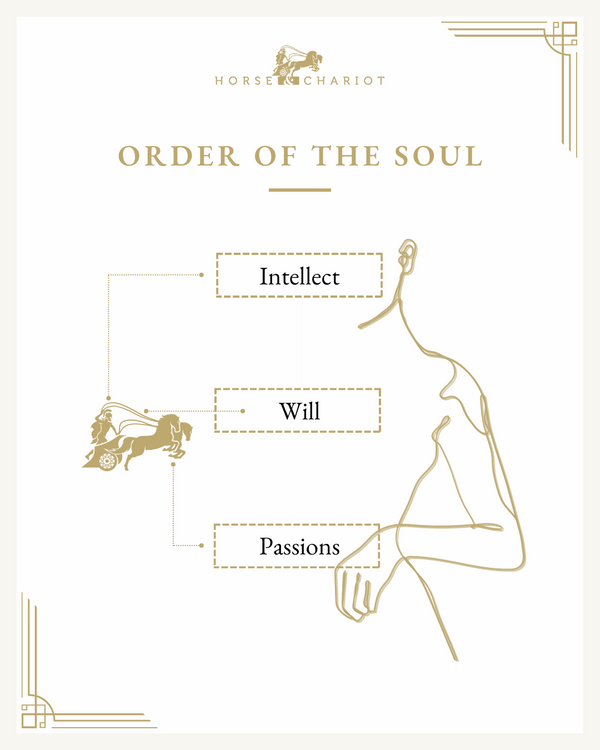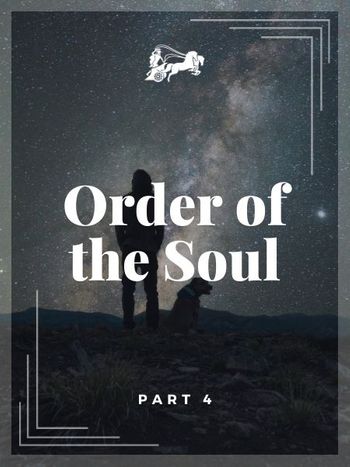All Series > Well-Ordered Soul > Part 4
Order of the Soul
Teaching of Virtue
Watch: On YouTube
Order of the Soul
Virtue teaches that our soul, like the horse and chariot (taught previously), is divided into three parts: intellect, will, and passions; referred to as “The Order of the Soul” by Saint Thomas Aquinas.
The upper two parts of the human soul are comprised of the intellect and will; the passions are in the lower part of the soul and are always bouncing around due to our natural appetites and emotions.
Aquinas taught, the three parts of the human soul are unique when compared to the souls of angels and animals. Angels are led by all intellect and will—no passions (as they have no appetites or emotions). They operate in perfect union with God's will. Whereas, animals are led fully by their passions—not intellect and will (as they lack cognitive reasoning and rationale). This is why when someone is intoxicated they often act like an animal because they’ve darkened their intellect and weakened their will.
Angels do the will of God. Animals do the will of the animals. Humans have free will. This is what truly makes us unique; we have free will to choose to be like the angels or the animals...to do the will of God, or do the will of self...to follow our passions blindly, or to wisely direct them for good.
So as the charioteer of your soul, grab the reins to the mighty horses of your passions and emotions; and with the strength of your intellect and will, harness their power to do God’s will, and lead you down the narrow path of a virtuous life.

Scroll down for the related scriptures, quotes, and lesson plan associated with this teaching.
Copyright © 2022 Horse & Chariot LLC. All rights reserved.
Visual Resource

Related Scripture
“Set your minds on things that are above, not on things that are on earth.” — Colossians 3:2 (ESV)
“For what will it profit a man if he gains the whole world and forfeits his soul? Or what shall a man give in return for his soul?” — Matthew 16:26 (ESV)
“Beloved, do not imitate evil but imitate good. Whoever does good is from God; whoever does evil has not seen God.” — 3 John 1:11 (ESV)
“For the word of God is living and active, sharper than any two-edged sword, piercing to the division of soul and of spirit, of joints and of marrow, and discerning the thoughts and intentions of the heart.” — Hebrews 4:12 (ESV)
“Therefore put away all filthiness and rampant wickedness and receive with meekness the implanted word, which is able to save your souls.” — James 1:21 (ESV)
“And Mary said, ‘My soul magnifies the Lord.’” — Luke 1:46 (ESV)
“For he satisfies the longing soul, and the hungry soul he fills with good things.” — Psalm 107:9 (ESV)
“Why are you cast down, O my soul, and why are you in turmoil within me? Hope in God; for I shall again praise him, my salvation.” — Psalm 42:5 (ESV)
“Restore to me the joy of your salvation, and uphold me with a willing spirit.” — Psalm 51:12 (ESV)
“For to set the mind on the flesh is death, but to set the mind on the Spirit is life and peace.” — Romans 8:6 (ESV)
Related Quotes
“Now the soul of the human is hierarchical. The highest power in the soul is the intellect. Next there is the will. Below the will are the passions. The passions fall into two categories: the concupiscible appetite and the irascible appetite. These passions relate to the human body. Angels also have an intellect and will, but they do not have the passions. To understand passions, think in terms of appetites, emotions, or bodily instincts.” — Dr. Taylor Marshall
“The life of the body is the soul; the life of the soul is God.” — St. Anthony of Padua
“You don’t have a soul. You are a soul. You have a body.” — C.S. Lewis
“The first end I propose in our daily work is to do the will of God; secondly, to do it in the manner he wills it; and thirdly to do it because it is his will.” — St. Elizabeth Ann Seton
“Only the free will is capable of good or evil. But when the will sighs [and stands firm] under the trial of the tempter and does not will what is presented to it, there is not only no fault but there is virtue.” — St. Padre Pio
“For man, when perfected, is the best of animals, but, when separated from law and justice, he is the worst of all; since armed injustice is the more dangerous, and he is equipped at birth with the arms of intelligence and with moral qualities which he may use for the worst ends. Wherefore, if he have not virtue, he is the most unholy and the most savage of animals, and the most full of lust and gluttony. But justice is the bond of men in states, and the administration of justice, which is the determination of what is just, is the principle of order in political society.” — Aristotle
“Since we are animallike, we experience the passions for pleasure (food and sex) and also the passions of fear and anger. Unlike animals, we can say ‘no’ to our passions, since we possess rational souls. A dog might start mating with a strange dog, but humans can temper their libidos—even completely if they desire. Incidentally, Thomas Aquinas and other medievals pointed to the vocation of celibacy as ultimate proof that man can conquer his passions perfectly. Similarly, a mother bear may kill a hiker who comes between her and her cub. Yet, a human mother is able to abstract and reason as to whether killing someone is the appropriate act with regard to an unsuspecting hiker.” — Dr. Taylor Marshall
“But man is freer than all the animals, on account of his free-will, with which he is endowed above all other animals.” — St. Thomas Aquinas
“Embellish the soul with simplicity, with prudence...Walk according to God; for, as a poet hath said, his laws govern all.” — Marcus Aurelius
“For the real difference between humans and other animals is that humans alone have perception of good and evil, just and unjust, etc.” — Aristotle
“In bad or corrupted natures the body will often appear to rule over the soul, because they are in an evil and unnatural condition. At all events we may firstly observe in living creatures both a despotical and a constitutional rule; for the soul rules the body with a despotical rule, whereas the intellect rules the appetites with a constitutional and royal rule. And it is clear that the rule of the soul over the body, and of the mind and the rational element over the passionate...” — Aristotle
“Remember that you have only one soul; that you have only one death to die; that you have only one life. . . . If you do this, there will be many things about which you care nothing.” — St. Teresa of Avila
“The image of God always abides in the soul, whether this image be obsolete and clouded over as to amount to almost nothing; or whether it be obscured or disfigured, as is the case with sinners; or whether it be clear and beautiful as is the case with the just.” — St. Thomas Aquinas
“You need a change of soul rather than a change of climate.” — Seneca
“The soul is perfected by knowledge and virtue.” — St. Thomas Aquinas
“The things you think about determine the quality of your mind. Your soul takes on the color of your thoughts.” — Marcus Aurelius
“Virtue is the beauty of the soul.” — Socrates
“To be human is to be challenged to be more divine. Not even to try to meet such a challenge is the biggest defeat imaginable.” — Maya Angelou
“Your days are numbered. Use them to throw open the windows of your soul to the sun. If you do not, the sun will soon set, and you with it.” — Marcus Aurelius

Lesson Plan
For your family, small group, or personal reflection.
STEP 1: Introduction
Example: "I'm going to play a short video on the topic of “The Order of the Soul.” After the video, I have some questions to gather your thoughts and get the discussion started. We’ll then wrap up with a closing prayer."
STEP 2: Watch Video (or listen)
Watch (or listen to) the video of the teaching (cast to your TV via YouTube). If time allows, also read the teaching, related Scriptures, and related quotes.
STEP 3: Discussion / Reflection
What are the three parts of the human soul comprised of?
Saint Thomas Aquinas taught the three parts of the human soul are unique when compared to the souls of angels and animals. In what way?
With a properly ordered soul, one’s intellect directs their will, which virtuously directs their passions to do God’s will—no matter what temptation, trial, feeling of anger, fear, sadness, or any other kind of emotion the lower faculties stir up. With a disordered soul, one has little willpower over their passions and emotions, allowing them to run out of control and rule their life—failing to act virtuously because the passion for what they want fogs their intellect and overpowers their will. Knowing this, what can you do in your life to form a more well-ordered soul?
Did any of the related Scriptures or quotes stand out to you (please elaborate)?
Any other thoughts you’d like to share?
STEP 4: Wrap Up & Closing Prayer
Summarize and wrap up the discussion. Then, conclude with a sincere and humble prayer from the heart.

Buy the print of this teaching.
Join one of our free online training events.
Shop all our teachings of virtue prints.
Explore other virtue-based products.
Never miss a teaching — get all new teachings of virtue sent to your inbox free!




